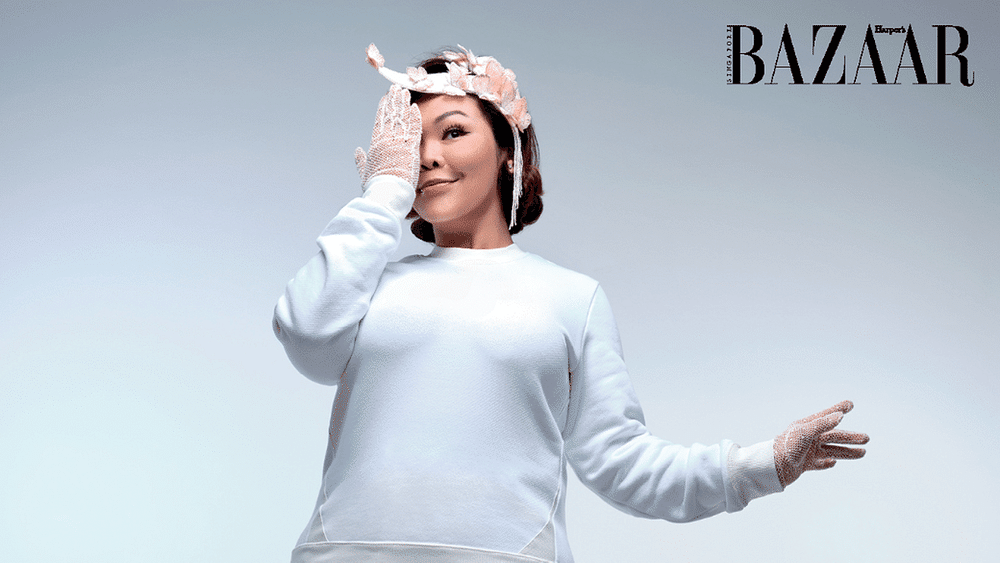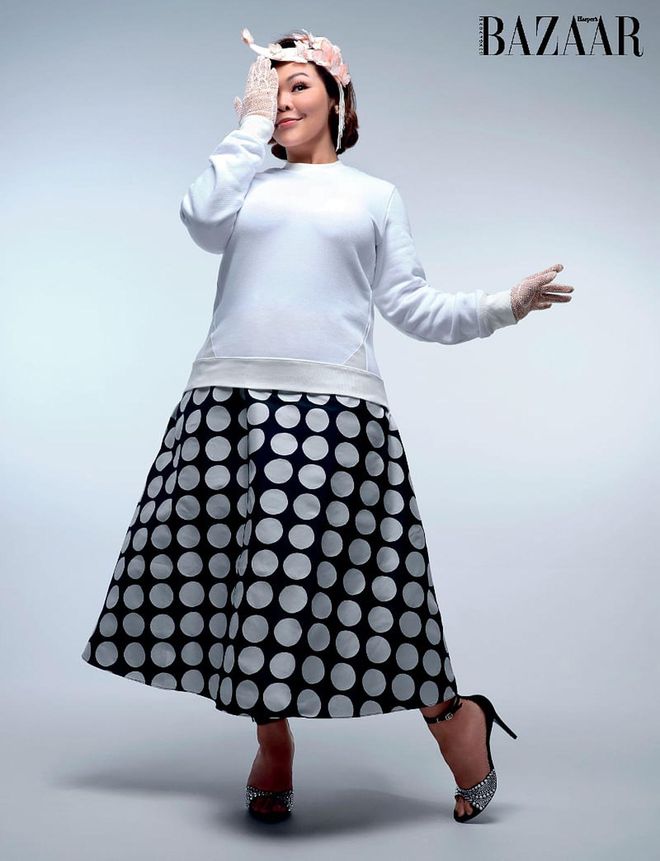BAZAAR Power List 2023: Siti Khalijah
“It’s the happiness at the end of the show—the standing ovations, the applause—because that means we’ve connected with the audience."


Sweater, Moncler. Skirt, Kate Spade New York. Headband, Eskapade. Sandals, Gucci. Gloves, stylist’s own.
siti khalijah
This year, we celebrate Singapore’s comedy queens and funny girls who have captured our hearts, tickled our ribs and got us thinking and reflecting on ourselves and society at large. Whether it’s through stand-up, sketches, or film, these funny girls have the courage, flair and smarts to not only succeed in the world of comedy, but to also thrive in it. Meet Siti Khalijah, a 38-year-old actor and host.
Related article: Going Global: Meet Gym Tan, The 62-Year-Old Singaporean TikTok Style Star
What was the most moving thing an audience member has said to you?
There are quite a number, depending on the shows that I do. What really leaves an impression on me is when it comes from the younger generation. When I grew up, I admired these actors and performers, and now years down the road, these younger students or performers say that I inspire and motivate them. It makes me feel like we’re passing something on to the next generation. Being a plus-sized girl myself, what I do is also to show the younger people who may not be deemed by society to be "normal-sized", that this is a safe environment where we are accepted based on our talent, and not because of how we look.
Was your sense of humour a coping mechanism in any way?
I never knew that I was funny. I used to babysit when I was in secondary school. That was my part-time job. The little kids that I would babysit found me funny. And I was like, ‘What is it in me?’ So they became my first test audience. But never would I have thought that it could have led to what I’m doing now, because it’s just me being silly, being the clown at family gatherings and things like that.
If you could change one thing about the industry that you're in, what would that be?
I wouldn't say change the industry, but how we are seen in the industry. Sometimes there's this thing called censorship and a lot of things are cordoned off. We're not allowed to say certain things when you know the intention is not to slam but just to bring awareness of that subject matter. Before we can even mention, we cannot, which makes it hard.
Are you naughty about finding a loophole?
Definitely. That’s why I prefer to do theatre instead of TV, because I feel that in theatre, we get a bit more leniency, and also because there are ratings. For example, when you watch a show that's rated R21, it means that we lose audiences who are below 21. But at least we still get to say what we want to say and send that message across. It's just that the crowd is slightly more niche and older.
Do you find yourself self-censoring?
I guess it depends on the subject matter. If certain issues are really sensitive, then I would self-censor – you want to make people laugh, but you don’t want to end up insulting or hurting other people who are innocent.
Related article: Singaporean Star Designer Jon Max Goh On Staying Local And Finding Success Abroad
Has it always been a clear line for you between what’s funny and what’s offensive?
It differs from person to person. For me, especially in this generation, I think when we make people laugh, we have to be even more sensitive or aware of who [your audience is]. A joke about a certain issue may have been funny 10 years ago, but times have changed, and that so-called joke you did 10 years ago, which may have been acceptable to everybody back then, might not land the same now. You need to be a thinker and be aware of what’s happening socially and, not to say self-censor, but just be more sensitive to what’s happening currently.
What is power to you?
It’s having something strong that others don’t, and making good things out of it. For example, if you have wealth and other people don’t, how do you then use the power that you have to share it or make good things out of it? Or, in this instance, we're talking about comedy – how do you make people forget their problems temporarily, and give them something that they will always remember whenever they’re feeling down or sad?
In what mode do you feel most powerful?
It’s definitely when I’m on stage, when I’m being funny. If I think about what I’m doing, I’m just on stage, trying to make people relax and have fun. It is scary. But ironically, it’s when I feel most powerful. You are given this task, and people are there to watch you. So I think you know that they’re with you. When I am on stage, it is a heightened version of myself, so there’s also the extra confidence.
What would you say is the biggest misconception that people have about your job?
That it’s easy, because it’s not. When people watch a comedy show, where there are many people in the lineup, and then they see someone for 10 minutes – no singing, no dancing, just standing and talking to people – they think it's easy. I tell those people, “Why don’t you try doing that?” I remember the very first time I did [stand-up comedy], you don’t know how the audience is going to react. The jokes that you have may be funny to you, but funny is subjective. What you find funny may only be funny to 50% of the audience, and to others, it’s not.
Know your audience, their age range, to make sure that they can connect with you, that they can relate, because it’s subjective. It’s also listening to how they would react, to know whether the joke will work or not. And when it’s not working, how do you then just take it in your stride and move on and pretend that you’re not affected and move to your next joke? As comedians, we have to be smart in the way we think, we have to be quick on our feet and we have to listen to the audience to know when to move on, because I have like 10 other jokes which I know you will laugh at.
Related article: Singaporean Director He Shuming Reflects On Life After ‘Ajoomma’
This interview has been edited and condensed for clarity.
Photographed by Wee Khim
Creative direction and styling by Windy Aulia
Producers: Cindy Ow, Navin Pillay
Makeup: Manisa Tan
Hair: Karol Soh
Stylist’s assistants: Naysa Pradhan, Zoe Tauro